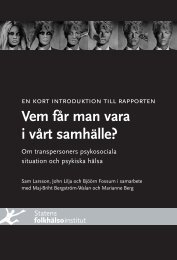Gambling motivation and involvement: A review of social
Gambling motivation and involvement: A review of social
Gambling motivation and involvement: A review of social
Create successful ePaper yourself
Turn your PDF publications into a flip-book with our unique Google optimized e-Paper software.
However, several scholars have maintained that gambling in Western societies is<br />
connected with existential issues <strong>and</strong> contains elements <strong>of</strong> a religious nature [263].<br />
It has been argued, for instance, that gambling activates “a mystical state” [251p. 138 pp. 359-60 ], induces a “conscious mood <strong>of</strong> mysticism” [278 ], “possesses a metaphysical<br />
<strong>and</strong> almost sacred meaning” [279p. 200 ], “encapsulates the area <strong>of</strong> mystery” [6p. 26 p. 35 ], establishes “a numinous connection” [264 ], provides an outlet for animistic<br />
beliefs [61, 280] <strong>and</strong> “excites the deepest <strong>of</strong> all interest in life – that in the transcendent,<br />
the dark obscure beyond” [281p. 406 ].<br />
In a paper entitled <strong>Gambling</strong> <strong>and</strong> Religion: Histories <strong>of</strong> Concord <strong>and</strong> Conflict,<br />
the present author [263] presents a theoretical model for how to underst<strong>and</strong> these<br />
diverse relationships between gambling <strong>and</strong> religion in various societies <strong>and</strong> at various<br />
times in history:<br />
It is argued that gambling <strong>and</strong> religion have certain elements in common: notions<br />
<strong>of</strong> the unknown, mystery, <strong>and</strong> fate, as well as imagery <strong>of</strong> suddenly receiving something<br />
<strong>of</strong> great value that changes life for the better. In many traditional cultures<br />
gambling has existed in concord with polytheistic <strong>and</strong> animistic religion; gambling<br />
<strong>and</strong> religion go well together precisely because <strong>of</strong> the elements they have in common.<br />
Monotheistic religions that claim authority in religious <strong>and</strong> transcendental matters,<br />
however, tend to denounce gambling <strong>and</strong> this disapproval has been fueled by a conception<br />
that gambling <strong>of</strong>fers a wicked alternative to certain religious notions <strong>and</strong><br />
experiences. The elements that gambling <strong>and</strong> religion share have thus become a<br />
source <strong>of</strong> conflict (p. 145).<br />
Thus, in contemporary, secular Western societies, gambling is to some extent motivated<br />
by an interest in matters <strong>of</strong> an existential <strong>and</strong> religious nature. The present<br />
author has explored how such an interest structures the content <strong>of</strong> Swedish newspaper<br />
articles on jackpot winners [44]. In a study <strong>of</strong> a large sample <strong>of</strong> such articles<br />
(about 2000 items), four cultural topics were identified: wealth as a test <strong>of</strong> morals<br />
<strong>and</strong> character, the <strong>social</strong> impact <strong>of</strong> wealth, the just <strong>and</strong> good world, <strong>and</strong> luck <strong>and</strong><br />
the occult. It was concluded that, by providing a discursive realm for existential <strong>and</strong><br />
moral issues, narratives <strong>of</strong> jackpot wins to some extent fill a void left by the decline<br />
<strong>of</strong> traditional religion <strong>and</strong> folklore. This can be assumed to stimulate the interest in<br />
lotteries <strong>and</strong> other games <strong>of</strong> chance.<br />
In the words <strong>of</strong> the American play theorist Brian Sutton-Smith [254], “games<br />
<strong>of</strong> chance <strong>and</strong> gambling are … basically a kind <strong>of</strong> religious effort to deal with fate,<br />
a kind <strong>of</strong> existential optimism” (p. 72). <strong>Gambling</strong> has <strong>of</strong> course other aspects as<br />
well, but as the late Gordon Moody, Minister <strong>of</strong> the Methodist British Church <strong>and</strong><br />
engaged in problem gambling issues, remarked [282]: “the roots <strong>of</strong> gambling do lie<br />
deep in our general human experience” (p. 50).<br />
48 G A M B L I N G M O T I VAT I O N A N D I N V O LV E M E N T

















